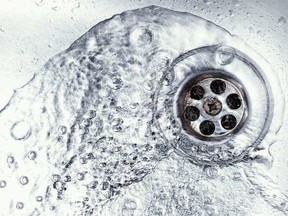Lifestyle
Avoid These Five Household Items to Prevent Drain Blockages

Improper disposal of household waste can lead to significant plumbing issues and environmental harm. Experts warn that certain items, often discarded out of convenience, should never be poured down the drain. Neglecting proper disposal methods can result in costly repairs and contribute to local sewage system backups.
Five Harmful Items to Keep Out of Your Drain
Grease, fats, and oils top the list of substances that should never enter your sink. According to the City of Calgary, these liquids can solidify and cause serious clogs in pipes, leading to major wastewater blockages. In Calgary alone, the city responds to over 8,000 sewer backups annually, spending approximately $3 million on repairs. To dispose of leftover grease, allow it to cool in a container until it solidifies, then dispose of it in the compost bin.
Another common item to avoid is paint. “Paint contains harmful chemicals that can corrode pipes and should be disposed of according to local regulations,” explains Kyle Leman, CEO of Crossroads Foundation Repair. Many municipalities recommend taking leftover paint to a hazardous waste facility or a paint recycling center. For instance, the city of Hamilton has a paint reuse program where residents can donate their leftover paint for others to use.
Certain food items also pose a risk to plumbing. Coffee grounds, eggshells, and fibrous vegetables like onions and corn husks should never be flushed down the sink. According to Shlomo Cherniak, owner of Cherniak Home Services, starchy foods such as potatoes, rice, and pasta can expand and create a glue-like substance, leading to clogs. It is advisable to place food waste in a compost bin instead.
Cleaning Solutions and Medications
Household cleaning solutions often contain corrosive chemicals that can damage pipes. Bleach is particularly problematic, as it can react with other substances in the plumbing system, creating dangerous compounds. The Government of Canada advises checking municipal guidelines for safe disposal methods of these cleaning agents.
Finally, medications must be handled with care. Flushing pills or prescription substances down the drain can lead to contamination of waterways, which poses a threat to aquatic wildlife. Residents are encouraged to return unused medication to their local pharmacy, which is equipped to dispose of it properly.
By following these guidelines and ensuring proper disposal of household waste, individuals can help prevent plumbing issues and contribute to environmental protection.
-

 Lifestyle2 months ago
Lifestyle2 months agoWinnipeg Celebrates Culinary Creativity During Le Burger Week 2025
-

 Education2 months ago
Education2 months agoBrandon University’s Failed $5 Million Project Sparks Oversight Review
-

 Science3 months ago
Science3 months agoMicrosoft Confirms U.S. Law Overrules Canadian Data Sovereignty
-

 Health3 months ago
Health3 months agoMontreal’s Groupe Marcelle Leads Canadian Cosmetic Industry Growth
-

 Science3 months ago
Science3 months agoTech Innovator Amandipp Singh Transforms Hiring for Disabled
-

 Technology3 months ago
Technology3 months agoDragon Ball: Sparking! Zero Launching on Switch and Switch 2 This November
-

 Education3 months ago
Education3 months agoRed River College Launches New Programs to Address Industry Needs
-

 Technology4 weeks ago
Technology4 weeks agoDiscord Faces Serious Security Breach Affecting Millions
-

 Technology3 months ago
Technology3 months agoGoogle Pixel 10 Pro Fold Specs Unveiled Ahead of Launch
-

 Science3 months ago
Science3 months agoChina’s Wukong Spacesuit Sets New Standard for AI in Space
-

 Business2 months ago
Business2 months agoRocket Lab Reports Strong Q2 2025 Revenue Growth and Future Plans
-

 Education3 months ago
Education3 months agoAlberta Teachers’ Strike: Potential Impacts on Students and Families
-

 Technology3 months ago
Technology3 months agoWorld of Warcraft Players Buzz Over 19-Quest Bee Challenge
-

 Business3 months ago
Business3 months agoNew Estimates Reveal ChatGPT-5 Energy Use Could Soar
-

 Business3 months ago
Business3 months agoDawson City Residents Rally Around Buy Canadian Movement
-

 Technology1 month ago
Technology1 month agoHuawei MatePad 12X Redefines Tablet Experience for Professionals
-

 Technology3 months ago
Technology3 months agoFuture Entertainment Launches DDoD with Gameplay Trailer Showcase
-

 Science3 months ago
Science3 months agoXi Labs Innovates with New AI Operating System Set for 2025 Launch
-

 Technology3 months ago
Technology3 months agoInnovative 140W GaN Travel Adapter Combines Power and Convenience
-

 Business3 months ago
Business3 months agoBNA Brewing to Open New Bowling Alley in Downtown Penticton
-

 Technology3 months ago
Technology3 months agoGlobal Launch of Ragnarok M: Classic Set for September 3, 2025
-

 Technology3 months ago
Technology3 months agoNew IDR01 Smart Ring Offers Advanced Sports Tracking for $169
-

 Education2 months ago
Education2 months agoNew SĆIȺNEW̱ SṮEȽIṮḴEȽ Elementary Opens in Langford for 2025/2026 Year
-

 Technology3 months ago
Technology3 months agoArsanesia Unveils Smith’s Chronicles with Steam Page and Trailer










